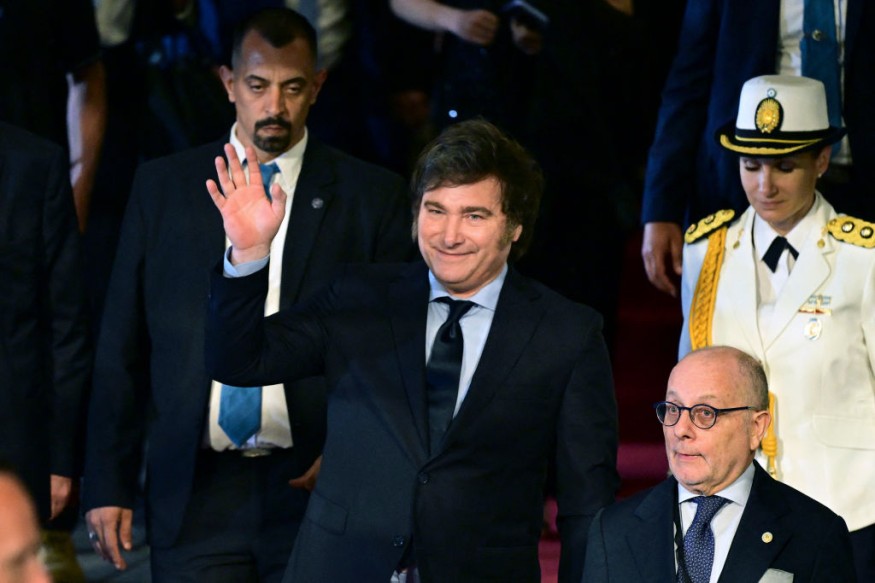Argentina Sharply Devalues Currency, Reduces Subsidies to Deal with Economic 'Emergency'

Argentina, facing a dire economic emergency, declared significant economic adjustments under President Javier Milei, according to the Independent.
The move, announced by Economy Minister Luis Caputo, includes a 50% devaluation of the Argentine peso, cutting energy and transportation subsidies, canceling public works projects, and reducing the size of the government.
In his televised address, Caputo revealed that the Argentine peso would be devalued from 400 to 800 pesos against the US dollar, acknowledging that the next few months would be challenging.
Milei, a libertarian who assumed office just two days ago, emphasized the urgency of these measures, stating that the country had no time to consider alternative solutions.
Argentina currently grapples with a staggering 143% annual inflation rate, a plummeting currency, and a significant portion of its population living in poverty.
Additionally, the nation faces a daunting fiscal deficit, a $43 billion trade deficit, and a looming $45 billion debt to the International Monetary Fund (IMF).
In his speeches, President Javier Milei emphasizes the financial constraints with the refrain, "There's no money," rejecting a gradualist approach. He pledges that the adjustments will primarily impact the state, not the private sector, viewing it as the initial move toward economic recovery.
READ NEXT : Argentina Economic Crisis
Argentina New Measures
As a part of the new measures, Caputo disclosed that the government is taking steps to cancel tenders for public works projects and downsizing certain state jobs to streamline the government's size.
Additionally, he unveiled plans to reduce energy and transportation subsidies, although specific details on the extent of these cuts were not provided, per CNBC.
Furthermore, Caputo announced a significant restructuring by reducing the number of ministries from 18 to 9 under Milei's administration.
These measures aim to tackle the fiscal deficit, which Caputo identifies as the root cause of Argentina's economic challenges, including skyrocketing inflation.
"If we continue as we are, we are inevitably heading toward hyperinflation," Caputo said. "Our mission is to avoid a catastrophe."
The IMF welcomed the bold steps, with spokesperson Julie Kozack stating that they provide a solid foundation for further discussions regarding Argentina's debt.
"These bold initial actions aim to significantly improve public finances in a manner that protects the most vulnerable in society and strengthens the foreign exchange regime," Kozak said.
Kozack added that the decisive implementation of these measures would contribute to stabilizing the economy and fostering more sustainable, private-sector-led growth.
Argentina President Javier Milei
President Milei, a 53-year-old economist who gained popularity through his outspoken critiques of the political establishment, faces a delicate balancing act.
His promises to eradicate corruption, eliminate the Central Bank, and replace the depreciating peso with the US dollar captured the electorate's attention during the campaign. However, the reality of governance has led to a more moderate approach.
Milei appointed Caputo, a former Central Bank president, as the economy minister, putting plans for dollarization on hold, AP reports.
The president's inaugural address conveyed a commitment to inclusivity, stating he had no intention of settling old vendettas and was open to collaboration with politicians and union leaders who support his agenda.
Milei's rise to power has been characterized by a rejection of the political status quo, with his victory in the November 19 elections signaling a shift away from the long-dominant Peronist political force. Despite this, he is likely to encounter resistance from Peronist lawmakers and unions, wary of potential wage losses.
As Argentina navigates these uncharted economic waters, Milei's ability to balance his campaign promises with pragmatic governance will be closely watched.
The president's acknowledgment of the immense challenges ahead and his openness to collaboration signals a departure from the fiery campaign rhetoric, emphasizing the need for practical solutions in the face of a complex economic crisis.
Read also: Mexico: El Chapo Mother Dies
This article is owned by Latin Post.
Written by: Bert Hoover
WATCH: Why is Argentina's economy such a mess? - From The Economist
Subscribe to Latin Post!
Sign up for our free newsletter for the Latest coverage!

















